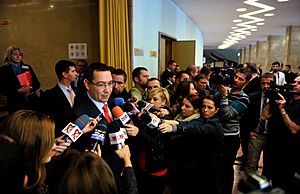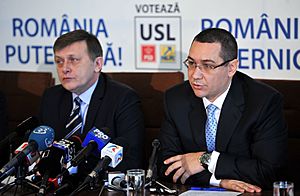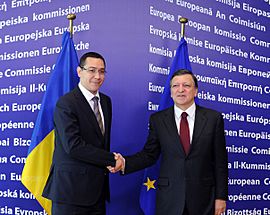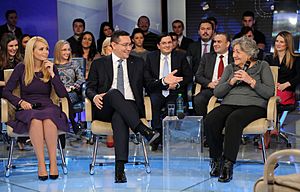Victor Ponta facts for kids
Quick facts for kids
Victor Ponta
|
|
|---|---|
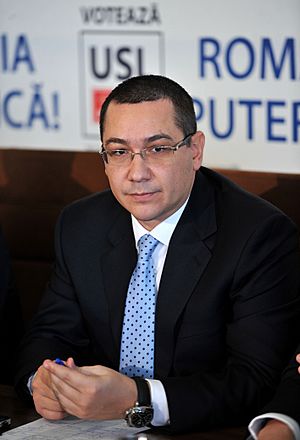
Ponta in 2014
|
|
| Prime Minister of Romania | |
| In office 10 August 2015 – 5 November 2015 |
|
| President | Klaus Iohannis |
| Deputy | Gabriel Oprea |
| Preceded by | Gabriel Oprea (Acting) |
| Succeeded by | Sorin Cîmpeanu (acting) |
| In office 9 July 2015 – 29 July 2015 |
|
| President | Klaus Iohannis |
| Deputy | Gabriel Oprea |
| Preceded by | Gabriel Oprea (Acting) |
| Succeeded by | Gabriel Oprea (acting) |
| In office 7 May 2012 – 22 June 2015 |
|
| President | Traian Băsescu Crin Antonescu (Acting) Traian Băsescu Klaus Iohannis |
| Deputy | Gabriel Oprea |
| Preceded by | Mihai Răzvan Ungureanu |
| Succeeded by | Gabriel Oprea (acting) |
| Member of the Chamber of Deputies | |
| Assumed office 20 December 2024 |
|
| Constituency | Dâmbovița County |
| In office 17 December 2004 – 20 December 2020 |
|
| Constituency | Gorj County |
| Minister of Parliamentary Relations | |
| In office 22 December 2008 – 1 October 2009 |
|
| Prime Minister | Emil Boc |
| Preceded by | Mihai Voicu |
| Succeeded by | Sorina-Luminița Plăcintă (acting) |
| President of PRO Romania | |
| In office 3 September 2017 – 2024 |
|
| Preceded by | Office established |
| President of the Social Democratic Party | |
| In office 21 February 2010 – 12 July 2015 |
|
| Preceded by | Mircea Geoană |
| Succeeded by | Rovana Plumb (acting) |
| President of the Social Democratic Youth | |
| In office November 2002 – November 2006 |
|
| Personal details | |
| Born |
Victor-Viorel Ponta
20 September 1972 Bucharest, Romania |
| Citizenship |
|
| Political party | Independent (since 2025) |
| Other political affiliations |
Social Democratic (until 2017; 2024–2025) PRO Romania (2017–2024) |
| Spouses |
Roxana Ponta
(m. 1998; div. 2006)Daciana Sârbu
(m. 2006; div. 2024) |
| Children | 3 |
| Relatives | Ilie Sârbu (father-in-law) |
| Alma mater | University of Bucharest Carol I National Defence University |
| Signature |  |
Victor Viorel Ponta (born 20 September 1972) is a Romanian politician and lawyer. He served as the Prime Minister of Romania from 2012 to 2015. He was also the leader of the Social Democratic Party (PSD) from 2010 to 2015.
From 2012 to 2014, he was a co-leader of the Social Liberal Union (USL). This was a political group that included his party and the National Liberal Party (PNL). Ponta was a member of the Romanian Parliament for Gorj County from 2004 to 2020. He was elected again for a seat in Dâmbovița County in 2024.
In the government led by Emil Boc, Ponta was a minister in charge of relations with Parliament from 2008 to 2009. When he became Prime Minister, his alliance won local elections. However, his time in office also saw some disagreements, including a political crisis in 2012. This crisis involved an attempt to remove the then-President, Traian Băsescu, which did not succeed.
Seven months after becoming Prime Minister, Ponta led his alliance to a big win in the 2012 parliamentary elections. This led to him being appointed for a full four-year term. Later, his alliance broke apart, and he formed a new government with the Democratic Alliance of Hungarians in Romania (UDMR).
In the November 2014 presidential election, Ponta ran for president but lost to Klaus Iohannis. His government resigned in 2015 after a tragic nightclub fire led to large public protests.
Contents
Early Life and Career
Education and Legal Work
Victor Ponta was born in Bucharest, Romania. He finished high school in 1991. In 1995, he graduated from the University of Bucharest with a law degree. He also studied at the Carol I National Defence University and earned a doctorate in Criminal Law in 2003. He has written several books about law, including one on the International Criminal Court.
From 1996 to 1998, and again since 2002, he taught Criminal Law at the Romanian-American University. Between 1995 and 1998, Ponta worked as a prosecutor in Bucharest. From 1998 to 2001, he was a prosecutor at the High Court of Cassation and Justice, focusing on economic and financial crimes. He also helped coordinate efforts to fight money laundering.
Entering Politics
From 2001 to 2004, Ponta worked for the government as the head of the Control Department. In this role, he helped uncover cases where international funds were used improperly. In March 2004, he became a minister in charge of overseeing international grant programs.
Ponta joined the Social Democratic Party (PSD) in 2002. He quickly became involved in the party's youth wing, the Social Democratic Youth (TSD), becoming its president for four years. In 2004, he was elected to the Chamber of Deputies, which is part of Romania's Parliament. He was re-elected in 2008. In December 2008, he became a minister in the government led by Emil Boc.
As a minister, Ponta promised to help Parliament oversee the government better. He also worked on new civil and criminal laws. He resigned from the government in October 2009, along with other PSD members, due to a disagreement.
Leading the Social Democrats
In February 2010, Victor Ponta was elected president of the PSD. He won against the previous leader, Mircea Geoană. In November 2011, Ponta led an effort to remove Geoană from his position as Senate President and from the party.
In February 2011, Ponta and Crin Antonescu, the leader of the National Liberal Party (PNL), formed a political group called the Social Liberal Union (USL). This group was in opposition to the ruling party at the time. Ponta resigned from the party leadership in July 2015.
As Prime Minister
Taking Office and Early Actions
In April 2012, after the previous government fell, President Traian Băsescu appointed Victor Ponta as Prime Minister. His government, which included ministers from the PSD, PNL, and other parties, was approved by Parliament the following month. Ponta became Prime Minister during a time of economic challenges in Europe. He promised to help the economy grow and create jobs.
In June 2012, the USL alliance won the local elections. Ponta called their victory in Bucharest a "historic moment."
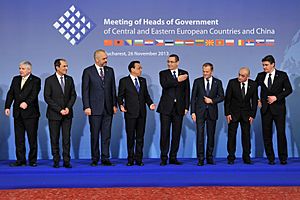
In his first few weeks as Prime Minister, Ponta's government made some changes. They moved the Romanian Cultural Institute from the President's control to Parliament's. This move was criticized by some who worried it would make the institute too political. His government also made changes to Romanian Television, which caused some disagreement among its employees.
Political Challenges and Elections
In July 2012, Ponta was at the center of a political crisis. This led to President Băsescu being temporarily removed from office by Parliament. There was a public vote to impeach Băsescu, but it did not succeed due to low voter turnout.
After the USL won the December 2012 parliamentary election, President Băsescu appointed Ponta for another term as Prime Minister. However, tensions grew between Ponta's party and the PNL. In February 2014, the PNL left the government, ending the USL alliance.
Ponta then formed a new government with the Democratic Union of Hungarians in Romania (UDMR). During his first two years in office, his governments increased the salaries of public employees. They also raised or introduced some new taxes.
Presidential Campaign and Resignation
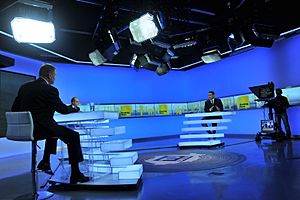
In July 2014, Ponta announced he would run for president in the upcoming election. He came in first in the first round of voting. However, in the second round, he lost to Klaus Iohannis. Many believed that problems with how Romanians living abroad voted in the first round played a role in his defeat.
The following month, the UDMR left the government. Ponta then formed his fourth government, including ministers from other parties.
In late October 2015, a tragic nightclub fire in Bucharest led to large street protests. People demanded the resignation of Ponta and others, linking them to corruption and indifference. Ponta resigned, saying he understood the public's "legitimate anger." A new government, led by Dacian Cioloș, took office two weeks later.
Later Political Life
After Aleksandar Vučić became President of Serbia in May 2017, Ponta was given Serbian citizenship. He said this was because of his government's help during the 2014 floods in Southeast Europe.
In June 2017, he was named secretary general in the government of Sorin Grindeanu. Because of this, he was automatically removed from the PSD party. Shortly after, the government was removed from office.
In May 2018, Ponta announced the launch of a new political party called PRO Romania. He described it as a center-left party. In the May 2019 European Parliament election, PRO Romania won two seats. The party later gained more seats in the Romanian parliament. Ponta eventually helped to bring down the government led by Viorica Dăncilă in October 2019.
In the 2020 parliamentary election, PRO Romania did not win any seats. Ponta then announced he would step back from politics for a while. In 2024, Ponta rejoined the PSD and won a seat in the Dâmbovița County Chamber in the parliamentary election.
Three months later, he left the PSD again. He disagreed with their decision to support Antonescu in the upcoming presidential election. In March 2025, Ponta started his independent campaign for the presidential election, focusing on nationalist ideas.
Personal Life
Victor Ponta has three children. He was married to Roxana Ponta from 1998 to 2006. In 2006, he married Daciana Sârbu, who later became a Member of the European Parliament. Daciana is the daughter of Ilie Sârbu, who was also a minister in a government Ponta served in. They had a daughter in 2008 and adopted another daughter in 2020. They divorced in 2024.
Ponta was a talented basketball player in his youth, winning a national championship in 1989. He also won the 2008 Dacia Logan Cup as a co-pilot in a car race. He is a big fan of the FC Steaua București football club.
He has received several honors, including the National Order for Faithful Service in 2002 and the Order of the Star of Italian Solidarity in 2004.
Electoral History
Presidential Elections
| Election | Affiliation | First round | Second round | ||||
|---|---|---|---|---|---|---|---|
| Votes | Percentage | Position | Votes | Percentage | Position | ||
| 2014 | PSD-UNPR-PC Alliance | 3,836,093 |
40.4%
|
1st | 5,264,383 |
45.6%
|
2nd |
| 2025 | Independent | 1,230,164 |
13.04%
|
4th | Did not qualify | ||
See also
 In Spanish: Victor Ponta para niños
In Spanish: Victor Ponta para niños
- First Ponta cabinet
- Second Ponta cabinet
- Third Ponta Cabinet
- Fourth Ponta Cabinet
 | Lonnie Johnson |
 | Granville Woods |
 | Lewis Howard Latimer |
 | James West |


